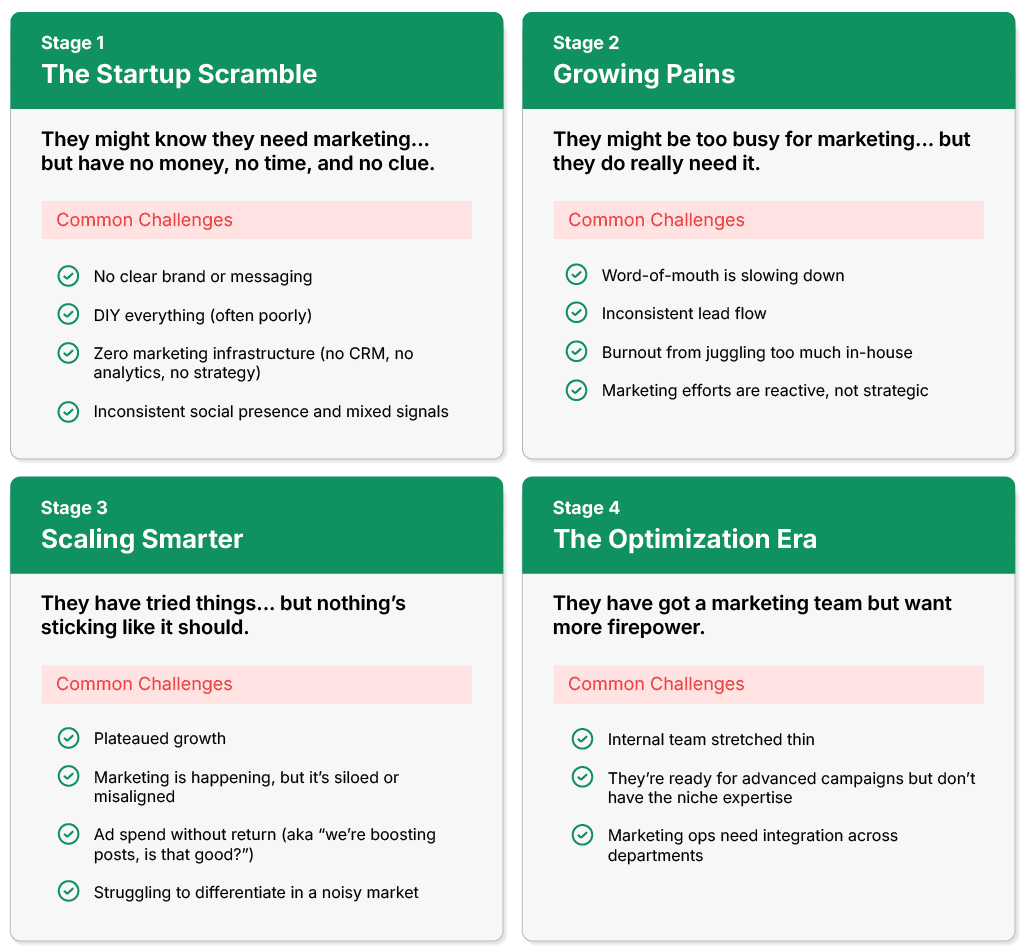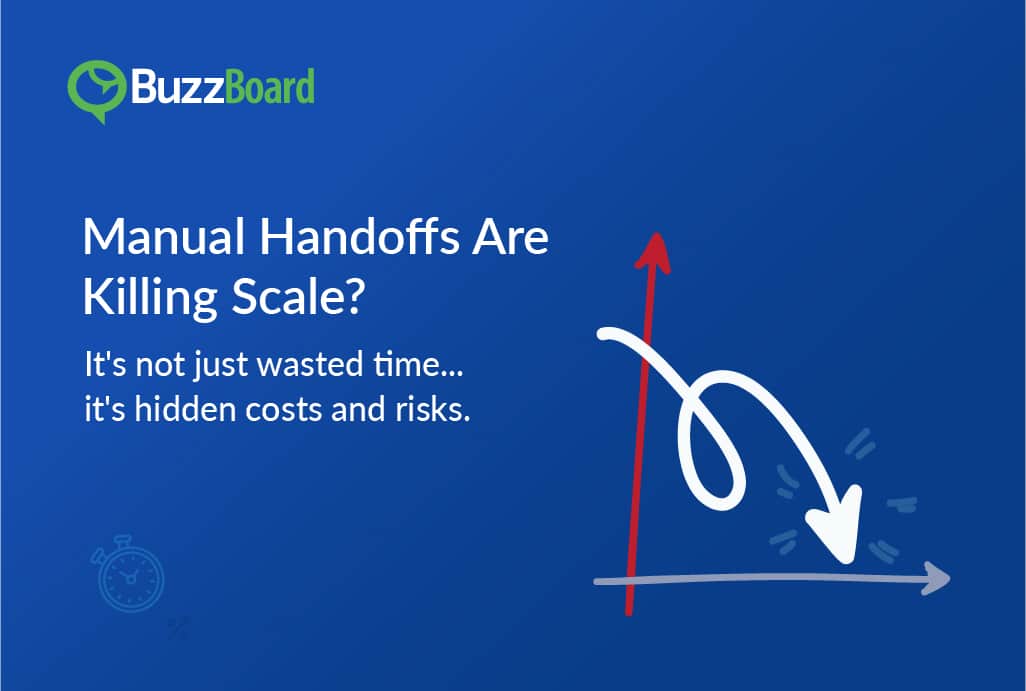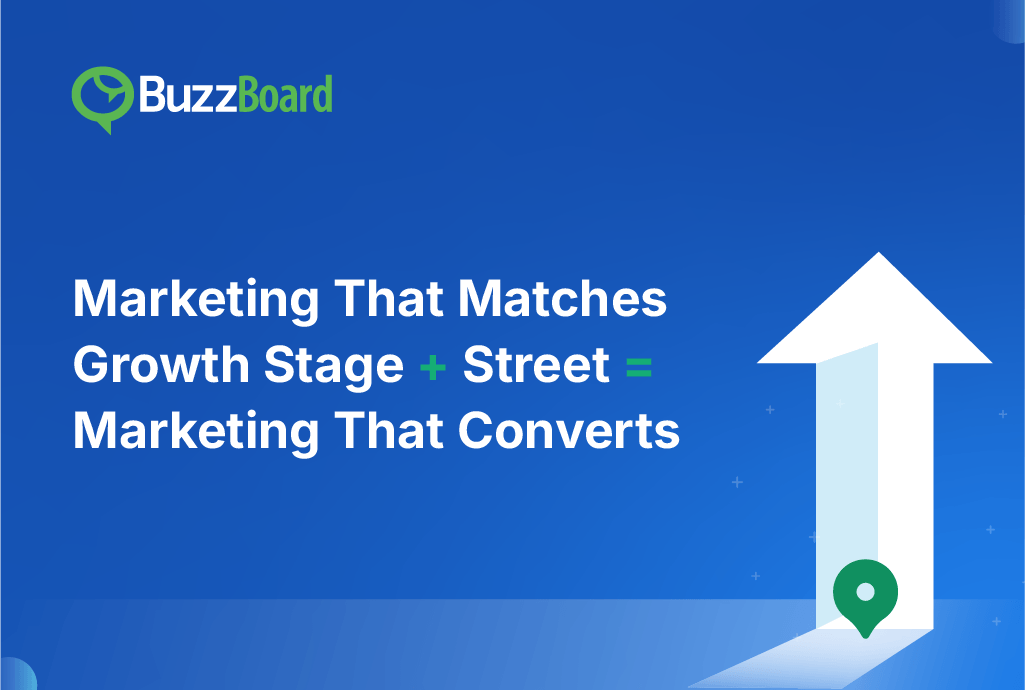Let’s face it—helping small businesses with marketing isn’t just about knowing what works. It’s about knowing when it works… and for whom.
One of the biggest missteps agencies and digital marketing service providers make when serving small businesses is assuming that all SMBs are facing the same marketing challenges.
A boutique law firm in its first 6 months? Very different beast from a local coffee chain trying to open its fifth location. And yet, many marketing strategies are rolled out like one-size-fits-all hats… only to slip off, squeeze tight, or just plain flop.
That’s why you need two critical lenses to get behind the scenes of small business marketing challenges better amid all the smoke and mirrors:
When you understand where a small business is in its journey and where it operates, you unlock the real formula for relevance. And relevance, as we all know, is the difference between campaigns that convert… and campaigns that collect dust.
Understanding Small Business Marketing Challenges at Different Stages of Growth

Why and How It Matters to Understand Small Business Marketing Challenges by Growth Stage?
A number of small businesses struggle to allocate their marketing budget effectively while many struggle to measure the ROI of their marketing efforts. Additionally, numerous small businesses lack a dedicated marketing team, making it challenging to execute marketing strategies.
Marketing challenges for small businesses are more than one, and what all will tell you is that with small businesses, you need to apply the right tactics! But marketing isn’t just about tactics—it’s also about timing. And when it comes to small businesses, their biggest challenges tend to shift dramatically depending on where they are in their growth journey.
Think of it like this: a business just starting out is probably worried about getting any attention at all. They’re Googling “how to make a logo” or “should I run Facebook ads with $50.” Meanwhile, a more established business might already be running campaigns. But they’re stuck, trying to figure out why leads aren’t converting or why their growth has plateaued.
If you, as an agency or marketing service provider, don’t take their growth stage, digital maturity, and market conditions into account, you risk offering the wrong solutions, like recommending a sophisticated email funnel to a business that doesn’t even have a lead magnet yet. Not only does that kill results, it erodes trust… fast!
But when you match your strategy to your small business (SMB) clients’ maturity level, a few powerful things happen:
Understanding Marketing Challenges for Hyperlocal Small Businesses
Because “near me” is the new storefront.
Marketing a small business is tough enough. But marketing a hyperlocal small business? That’s a whole different beast.
These aren’t your VC-backed DTC brands or national service chains. We’re talking about the dry cleaner on Main Street, the dog groomer two blocks down, the pizza shop whose delivery radius cuts off halfway through the neighborhood. Their world is small, and that’s exactly what makes their marketing so tricky (and so interesting).
If you’re an agency or digital marketing service provider trying to help them grow, you’ve got to think local, and we mean really local.
What Makes Hyperlocal Marketing So… Hyper-Specific?
Hyperlocal businesses rely almost entirely on their immediate community to survive and thrive. They don’t care about impressions in the next city over. They care about the people within walking distance, those who drive by every day, or who search “best sandwich near me” at 12:47 PM.
Their biggest marketing challenges aren’t about scale; they’re about visibility, trust, and proximity.
This means you need to get a lot more tactical here. Let’s discuss the common marketing challenges for hyperlocal businesses:
What Are the Key Advantages of Hyperlocal Marketing Awareness?
Evidently, small businesses operate in markets and also in neighborhoods. That means their marketing needs aren’t just about industry trends or general best practices, they’re deeply shaped by local behavior, competition, culture, and context as well.
Understanding hyperlocal relevance means zooming in, not just by city or region, but often by block, street, or zip code. And that level of specificity changes everything—how they should show up online, how they compete, and how they connect with customers.
If you miss the local nuance, even the best marketing strategy can fall flat.
More Effective Targeting You can tailor messaging, promotions, and platforms to fit the habits and preferences of the actual community they serve.
Example: A Google Business Profile and local SEO may drive more ROI than social ads for a corner bakery.
Competitive Differentiation You can help your client stand out against local competitors, not just national or digital ones.
Example: Knowing what three other florists in the same zip code are doing gives you a serious edge.
Higher Conversion Potential People searching for local services are often ready to act, but they’ll only choose what feels close, relevant, and trusted.
Hyperlocal trust (via reviews, reputation, and visibility) = faster buying decisions.
Better Community Engagement Hyperlocal businesses thrive when they show up as part of the community. This lets you leverage community events, partnerships, and even local lingo to build connection.
Platform Efficiency Some platforms and tools work better in hyperlocal settings, like Google Maps, Nextdoor, local influencers, and neighborhood-specific Facebook Groups.
Back to Basics: Why Foundational Challenges Still Matter?
Sure, we’ve zoomed in on hyperlocal quirks and growth-stage nuances, and yes, those are crucial for crafting highly tailored strategies. But here’s the deal: even the most specific small business still grapples with the universal stuff—limited resources, inconsistent branding, ROI headaches, and the ever-morphing digital landscape. These aren’t just beginner problems. They’re persistent problems.
Why marketers should still care about the generic stuff:
For marketers, these generic problems represent not just obstacles, but opportunities. Ultimately, addressing these shared, systemic issues is what makes more advanced, customized marketing work—and stick.
Remember, not all small businesses have the same marketing challenges. Therefore, helping small businesses grow isn’t about pitching the flashiest marketing tactic, it’s about meeting them exactly where they are, both in their growth and in their geography. When agencies and marketers ignore these factors, they risk offering advice that’s not just ineffective but irrelevant.
So next time you’re building a proposal or planning a campaign for an SMB client, ask yourself: Where are they in their journey? Who are they trying to reach, right here, right now? And what’s still broken at the foundation? Because when you align strategy with stage, location, and lived reality, that’s when the real marketing magic happens.

